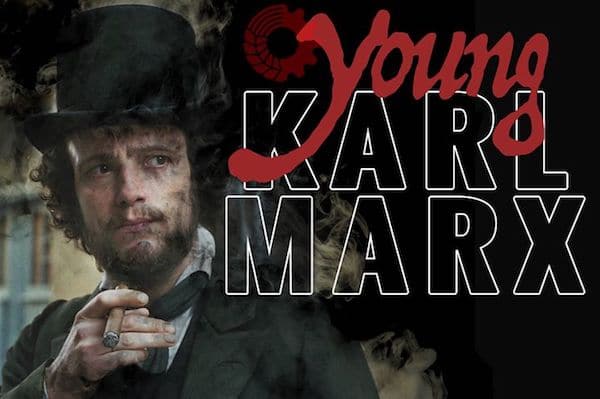The director, Haiti’s former culture minister Raoul Peck, who made the Oscar-nominated I Am Not Your Negro in 2016, wondered if he would find finance for his film. He did and The Young Karl Marx offers a glimpse into the adolescent years of the world we live in today and, in the process, transcends some serious obstacles to make its mark. A review, for Different Truths.
A young Ho Chi Minh serving pastries on the Newhaven-Dieppe ferry, a pretty Rosa Luxemburg in a velvet dress, the bold young Stalin expropriating banks in the Caucasus, the earnest law student Ulyanov — what is it that is so beguiling about the early lives of great revolutionaries?
Part of the attraction lies in the contrast between the drama of their later lives and our image of them in their mature years. But much of it, for the older generation, resides in the recognition of their younger selves and, for the younger, the prospect of what might be.
It is the same with Marx and Engels. Early imaginings are rare — a couple of engravings and some 20th-century speculative drawings. But in bronze, on canvas, on the printed page or online, bearded, aged and sagacious, the older Marx is ubiquitous.
In lands where socialism once triumphed, a tribute to the enduring power of these representations lies in the enthusiasm with which the beneficiaries of capitalist restoration tear down his likeness or park them in metaphorical graveyards of revolution.
Lenin held that “of all the arts the most important for us is the cinema.” Thus a film which depicts the early life of Marx, whose bicentenary we celebrate this year, promises much.
The director, Haiti’s former culture minister Raoul Peck, who made the Oscar-nominated I Am Not Your Negro in 2016, wondered if he would find finance for his film. He did and The Young Karl Marx offers a glimpse into the adolescent years of the world we live in today and, in the process, transcends some serious obstacles to make its mark.
The early tension between Marx and Engels is resolved into a warm friendship and collaboration, in theory, and action, with their maturing humanity, expressed in the love of good food, drinks, sharp polemic, romance, and revolutionary action.
The interplay of a French, German and English soundtrack and subtitling is a subtle metaphor for the itinerant lifestyle that the hostility of the emerging Prussian State, despite Marx’s marriage to the upper-class Jenny von Westphalen, made inevitable.
A major problem encountered by Peck and his co-writer Pascal Bonitzer is imperative to make a didactic film in a culture where the explicit presentation of revolutionary ideas encounters an audience unschooled in dialectical thought.
But, in an unambiguous projection of the materialist philosophy underpinning the mature works of Marx and Engels, the film ends with images of the industrial revolution that created the working class, interpolated with the text of the 1848 Manifesto of the Communist Party.
The travails of Rhenish wood-gatherers and the poverty and degradation of working-class life in industrial Manchester make the basic categories of Marxist thinking explicit, but the film has wider ambitions, taking up the shifting controversies of continental socialist politics.
Anarchist thinkers and Young Hegelian ideologues appear, disputes among German workers’ leaders highlight the struggle to overcome idealist and utopian thinking and, later, the narrow economism and anti-theory that has come to characterise the British labour movement.
It’s an entertaining film, which works both as an exploration of friendship and romantic love, with Marx’s Jenny and Engels’s Mary protagonists in their own right, and as an introduction to Marxism and revolutionary history, albeit one that takes a few liberties with established fact and historical sequence.
Solid politics, along with outstanding acting and directing, makes this an excellent film. Though it premiered at the Berlin Film Festival in February last year, it has not been released in Britain. This film is a must for all film lovers.
Nick Wright
The writer is a contributor to Morning Star.
©IPA Service
Photo from the Internet





 By
By

